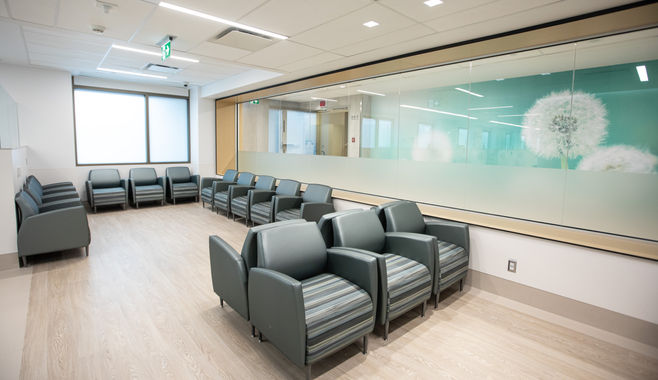MMR SUPPORTS EMERGENCY MEDICINE
The University Health Network (UHN) is a leading Canadian healthcare and medical research organization based in Toronto, renowned for its commitment to patient care, education, and groundbreaking research across various medical disciplines. It comprises multiple hospitals, including Toronto General Hospital, Toronto Western Hospital, and Princess Margaret Cancer Centre, collaborating to advance healthcare innovation and improve patient outcomes.
The Muskoka Hospital Foundation (SMHF) is a charitable organization dedicated to supporting health care in the Muskoka region by raising funds for essential medical equipment, facilities, and services. It plays a crucial role in enhancing and maintaining the quality of healthcare provided by the hospitals in the Muskoka area.

WHAT EMERGENCY MEDICINE IS FOCUSED ON IN 2024
UHN
Staff Wellness Training: Implementation of a mindfulness reset to train all ED staff in debriefing after cases, addressing challenges like handling patient deaths.
Debriefing Protocol: Introduction of a debriefing protocol to enable team discussions and reflections on cases, recognizing the unique demands of the ER environment.
Simulation Equipment Revamp: Focus on acquiring new mannequins for simulation training, including scenarios involving non-typical patients such as pregnant women or babies.
Rare Skills Sessions: Regular sessions held every two months to refresh skills in handling high-acuity, low-occurrence cases, aiming to enhance the team's expertise and confidence.
With our support, Dr. Dharamsi aims to implement a training protocol similar to the one used throughout the COVID-19 pandemic over the next 12 months. Read more about this approach with this article from The Independent Panel.
SMFH
Vital Signs Monitor: Monitors essential signs such as heart rate to ensure the patient's cardiovascular health.
Infant Warmer for Emergency Department: Provides a controlled, warm environment for infants in the emergency department, ensuring their comfort during monitoring and care.
Bladder Scanner: Utilized to detect and diagnose bladder issues without invasive procedures, enhancing diagnostic capabilities.
Various Hematology Equipment for the Lab: Essential equipment for diagnosing blood-related diseases and ensuring proper storage of samples and lab chemicals, crucial for timely and accurate patient treatment.
Infant Security System: A system designed to ensure the safety and security of infants in the healthcare setting, aligning with ministry standards.
IMPACT STORIES
The Rapid Assessment Center is Now Open!
The Rapid Assessment Centre at University Health Network's Toronto General Hospital is a specialized facility designed to expedite and enhance patient assessment in the Emergency Department. It addresses the challenges of overcrowding and increased demand for emergency care. The center is designed to be adaptable to the needs of a pandemic, ensuring that it can effectively respond to increased patient volumes during health crises such as the COVID-19 pandemic. With separate streams for complex and less sick patients, it aims to streamline the patient flow and ensure efficient care. Muskoka Motor Rally expresses deep gratitude to be a part of initiatives like these, recognizing the vital impact they have on improving healthcare accessibility.
Listen to insights from our esteemed colleagues, Dr. Sabbah, Dr. Chartier, and other dedicated clinicians, as they share their perspectives on the significance of the Rapid Assessment Center.
MMR Supports SMFH Equipment Acquisition
The proceeds from the rally supported the acquisition of essential equipment for the SMHF's Emergency Department. This included the addition of two new ECG machines, which played a crucial role in efficiently evaluating heart health and detecting signs of heart disease. Funds also contributed to the implementation of a negative pressure system in the trauma room, designed to safeguard patients with infectious illnesses from contact with others. Additionally, the support facilitated the acquisition of an intubation cart for rapid access to difficult airway equipment, an anesthesia machine for administering anesthesia during medical procedures, and a bladder scanner—a noninvasive portable tool for diagnosing, managing, and treating urinary outflow dysfunction. Overall, the rally greatly improved the Emergency Department's capabilities, leading to enhanced patient care.





























